In business, the customer is key. We all know this, right? But are you doing everything you can to satisfy them and retain their loyalty to your brand? You may be collecting enough customer data but not utilizing it best. Or not collecting enough data to analyze to meet your users’ ever-changing needs.
Enter the CRM (customer relationship management) tool, the all-purpose software solution for collecting and utilizing data to optimize your customer experience and have them stay loyal to your brand for the long term.
Fortune Business Insights valued the CRM software market at $63.91 billion in 2022 and is predicted to grow to $145.79 billion by 2029, proving the trust organizations place in its ability to help them align their business goals with customer needs.
In this article, we will explore CRM implementation through the following topics:
- Why do we implement CRM in sales?
- What are the benefits of CRM implementation?
- What are the five keys to successful CRM implementation?
Let’s begin with why we implement CRM.
Why do we implement CRM?
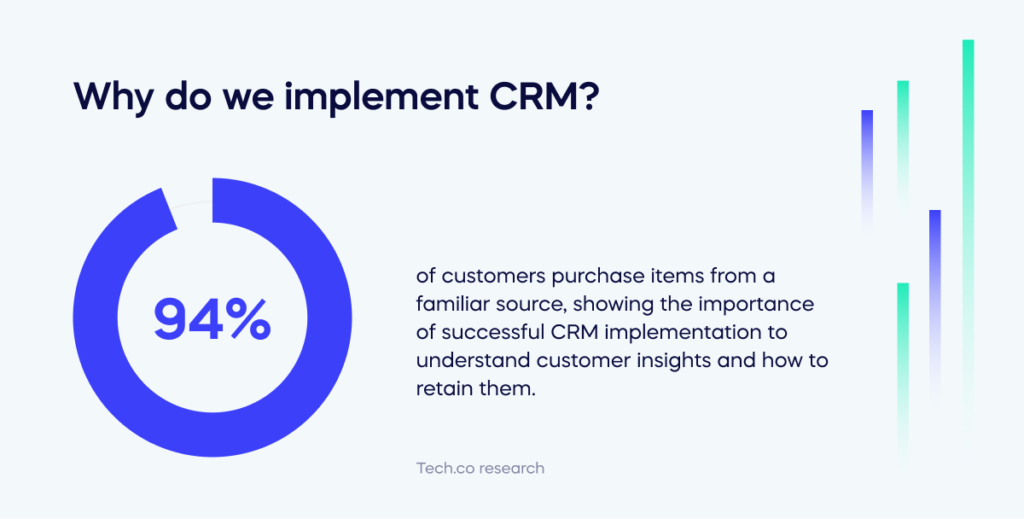
Tech.co research shows that 94% of customers purchase items from a familiar source, showing the importance of successful CRM implementation to understand customer insights and how to retain them.
In addition, the most successful CRM implementations provide many benefits for organizations. Using a CRM platform to organize and manage your data allows you to understand your customers better, as shown in the video below.
How to Achieve CRM Implementation Success [CRM Software, Customer Relationship Management]
An effective CRM implementation project results in more consistent messaging and the ability to automate tasks, making marketing efforts more targeted and sales cycles faster. And finally, successful CRM implementation allows you to deliver an optimized customer experience, helping you to retain customers.
What are the benefits of CRM implementation?
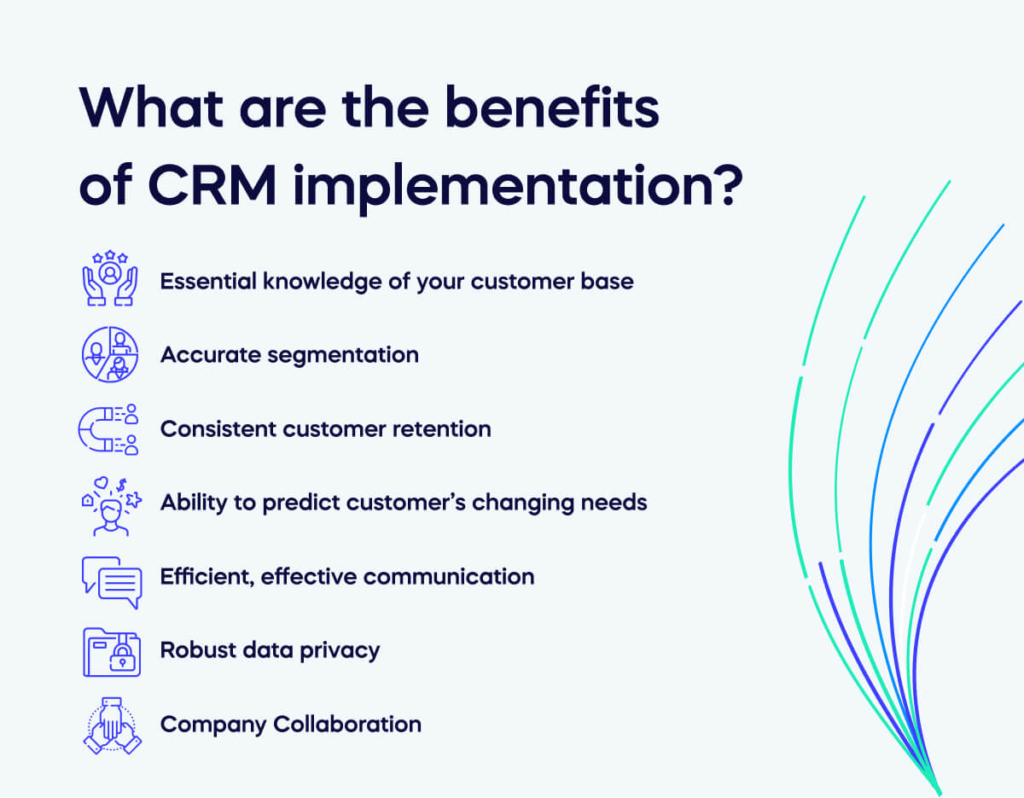
It’s helpful to look at the benefits of using a CRM to ensure it’s the tool you need for the task and focus on the right areas to optimize your CRM management. The first of these benefits is that a CRM gives you essential knowledge of your customer base.
Essential knowledge of your customer base
A significant difficulty in establishing lasting customer relationships is collecting accurate data and understanding the customer completely.
The best way to achieve this is to understand every customer through a 360-degree view by storing the data related to each contact in a single location, making CRM an incredibly effective communication tool.
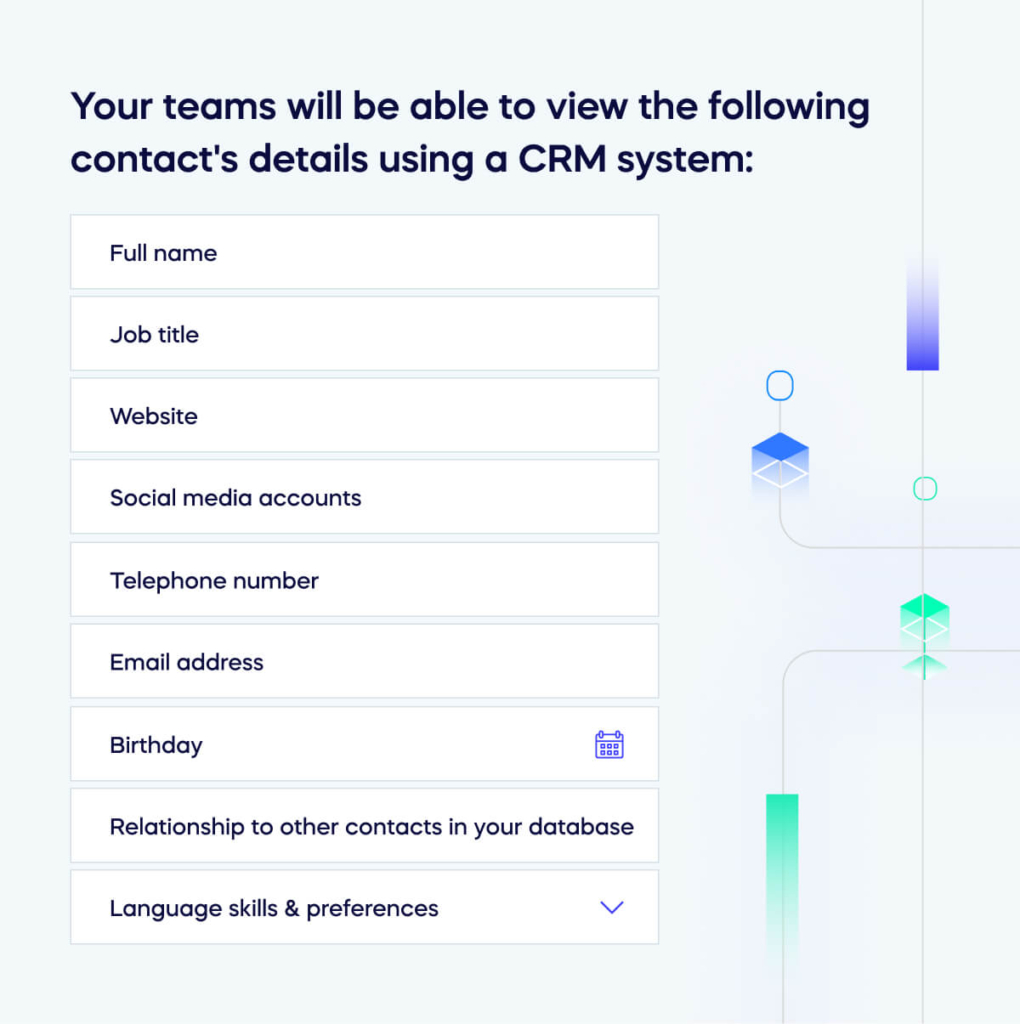
Your teams will be able to view the following contact’s details using a CRM system:
- Full name
- Job title
- Website
- Social media accounts
- Telephone number
- Email address
- Birthday
- Relationship to other contacts in your database
- Language skills & preferences
Using this information collected by the CRM software for each customer, it’s easy to customize your communication with a contact, helping you understand your contacts more thoroughly, know their needs and satisfy them.
However, your staff will not understand customers’ needs if they don’t know how to use their new CRM system. Our DAP (digital adoption platform) includes in-app guidance to overcome CRM adoption challenges, allowing your staff to use the new CRM without resistance to change and meet customers’ needs efficiently.
Accurate segmentation
It can be challenging to conduct business with a group of people without any personal connection. Ideally, businesses would prefer to work with an engaged and interested audience. But how can this be effectively achieved?
Segmenting your contacts into target audiences is best done using a CRM, which allows you to categorize and filter data effectively to create lists more focused on your desired criteria.
Segmented lists are used in sales and marketing to run targeted customer and account-based marketing campaigns. They also help in analyzing the sales process and lead pool.
Consistent customer retention
In addition to finding new customers, a CRM system is also valuable for maintaining the loyalty of your current customers. By providing functionalities such as appointment reminders and follow-up reminders, it can assist you in fulfilling your commitments and keeping your existing customers satisfied.
The vital point is that CRM can remind you to contact customers who haven’t been approached in a while and maybe feel ignored.
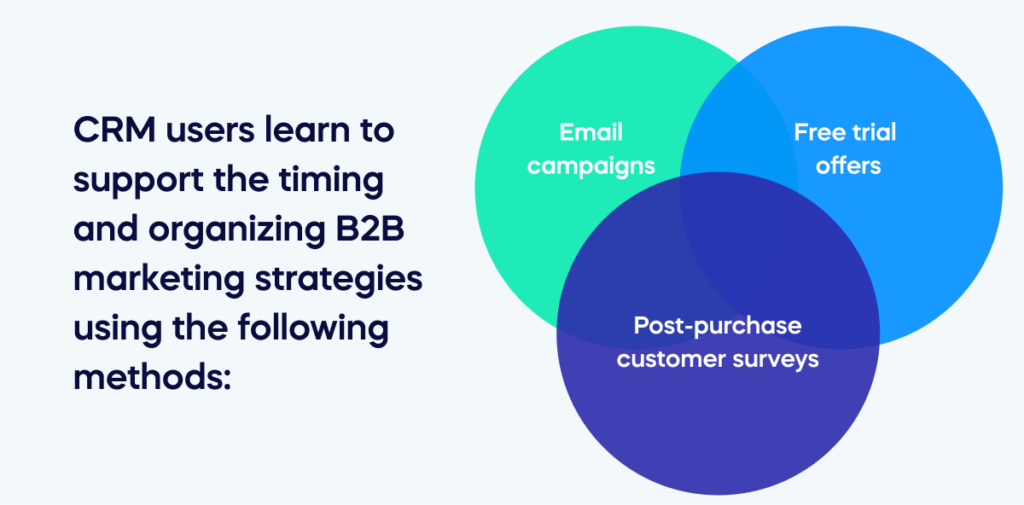
CRM users learn to support the timing and organizing B2B marketing strategies using the following methods:
- Email campaigns.
- Free trial offers.
- Post-purchase customer surveys.
These user data collection methods will help you maintain your customers’ interest. Also, ensure that all data is adequately transferred and you avoid duplications during CRM migration to a new CRM tool to ensure all customers are assigned.
Ability to predict customer’s changing needs
Knowing what to expect boosts our confidence, which also holds for businesses. Understanding a customer’s buying habits makes it simpler to cross-sell or upsell.
Keeping track of the contact’s previous purchases, offered contracts, buying patterns, and how they became your customers allows you to anticipate their needs and provide more or better deals at the appropriate times.
Having a CRM system is crucial for providing excellent customer service. It allows easy access to the interaction history, facilitating prompt customer service.
Efficient, effective communication
Being prompt in responding to customer requests reflects professionalism. You can save time for you and your customers using the CRM system, which provides customizable templates for emails, letters, documents, proposals, quotes, invitations, and newsletters.
A CRM system allows you to prepare and send emails and SMS messages in advance and schedule them to be delivered later. Furthermore, it is essential to address customer service requests quickly.
CRM provides easy access to contact interaction history, allowing you to personalize communication. You can send quick solutions to recurrent problems, links to FAQs and videos, and even make phone calls directly from the system.
Robust data privacy
Let’s discuss the General Data Protection Regulation (GDPR), a popular topic lately. To ensure compliance with this EU regulation’s data privacy requirements, it’s crucial to use CRM software with built-in GDPR-related features.
Using a CRM system can be beneficial for you in multiple ways, such as the following examples:
- Make sure to ask for permission from your contacts before storing and using their personal information, and document their consent.
- You can set up automatic notifications to inform new contacts that you want to store their data.
- Create a system that allows updating personal details for multiple contacts simultaneously by implementing group rules.
If you do everything manually, it will take a lot of time, and there is a chance that you may make mistakes. However, using a CRM system will quickly and reliably ensure your customer communications are GDPR compliant.
Company Collaboration
An effective CRM system helps manage customer relationships and fosters better collaboration within the organization.
You can enhance communication within your team by using cloud-based CRM systems that allow everyone to access the company’s communication and interactions with customers.
This means that transparency helps employees understand how to represent themselves and the company to potential customers.
Employee collaboration can significantly improve by communicating through messaging, commenting, sharing projects, and scheduling internal meetings using one system. As a result, productivity can be increased.
What are the 5 keys to CRM implementation?
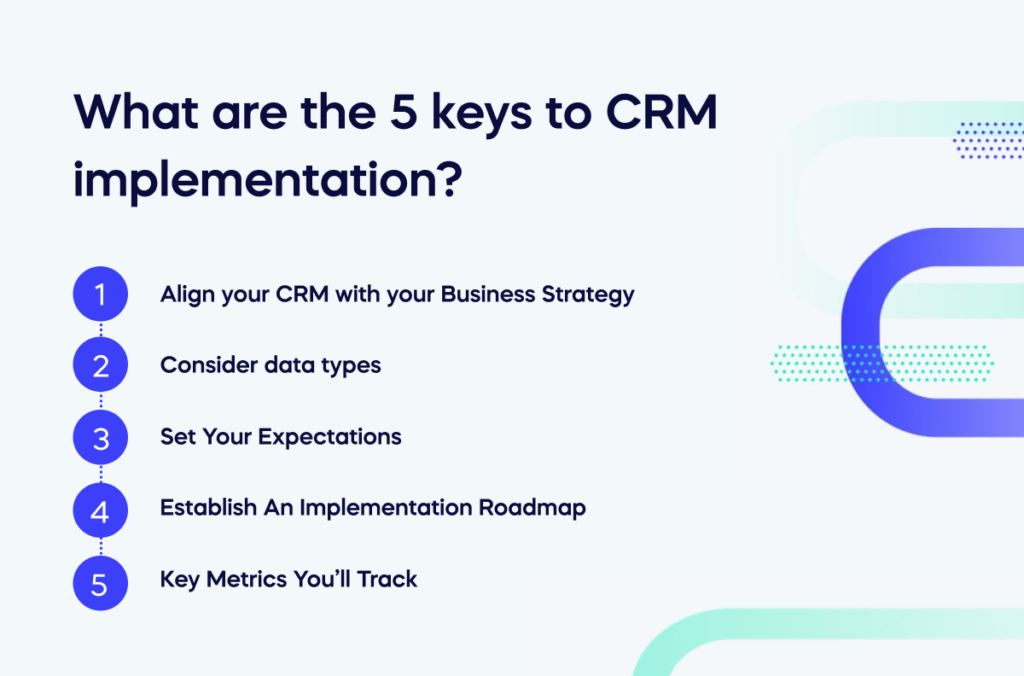
There are five keys to successful CRM implementation, starting with aligning your CRM with your sales strategy.
1. Align your CRM with your Business Strategy
To choose a CRM, it’s essential to understand its capabilities. So, before researching, define your marketing goals and objectives to help you decide which CRM is right for you. Keep in mind that each CRM has its strengths and limitations.
When choosing a CRM solution, look for the ones that specifically target the areas your goals are focused on. For instance, to enhance productivity among your sales team, find a CRM that can be integrated with your email provider. If you need to improve your sales pipeline, look for a CRM that has a complex deal pipeline for your sales team to utilize.
If you’re looking for ways to increase the number of leads, consider exploring CRMs that provide lead-generation features, such as online forms and landing pages.
2. Consider data types
To make the best decision, it’s essential for your CRM implementation team to thoroughly understand the information you can access with each CRM system you consider. The system you choose should be able to manage the data you already have and support the tasks your spreadsheets, workflows, and software currently perform.
To determine the data requirements for accessing, create a chart comparing data, features, and infrastructure needs. It’s advisable also to include expenses, type of setup, and technical support available.
3. Set Your Expectations
Many businesses adopt a CRM system without considering their specific expectations, assuming they need one simply because their competitors have one. However, this reasoning alone may not lead to the best choice.
Before your team starts using the new CRM, take some time to think about what you want to happen next. Take a look at these examples that illustrate this point:
- Implement a new lead nurturing process.
- Increase the number of leads per month by a certain percentage.
- Increase your customer lifetime value.
- Considering these benchmarks before implementation will ensure that your new tool offers value.
4. Establish An Implementation Roadmap
Inform the end-users of the CRM system about the timeline for deployment, the training process, and the expected time for them to become proficient in using it. Additionally, clarify when the previous tools, such as spreadsheets or databases, will be phased out instead of the new system.
To avoid negative impacts on morale and a poor start with the new system, it is essential to have a deployment plan with clear milestones that everyone involved understands. For instance, setting a goal for all stakeholders to finish an online training course by April 30 can be helpful.
5. Key Metrics You’ll Track
Once the CRM system is implemented, tracking progress toward achieving the set goals and objectives is essential by measuring the outcomes.
Please consider metrics such as:
- Are more leads being pursued?
- Does it look like this quarter’s sales figures will top last quarter’s?
- If so, by how much?
- Are your email campaigns leading to higher conversions?
To ensure a successful CRM implementation and determine your return on investment timeframe, you must know what you want from the system and track relevant KPIs. Before implementing a CRM tool, it’s crucial to consider these five factors to set yourself up for success and ensure a satisfying outcome.
Listen to customers to ensure CRM implementation success
The successful CRM implementation process involves leveraging the right strategy and putting the key elements in place.
Beyond this, companies must remember that customer input should be considered and valued at every process stage. Gathering customer feedback throughout builds trust between a company and its stakeholders and can provide invaluable insights into every successful CRM implementation plan.
As companies embark on their journey toward successful CRM implementation, they must not forget the importance of listening to customers. Doing so puts companies in a better position for long-term success and helps create more tailored strategies for all stakeholders involved.


